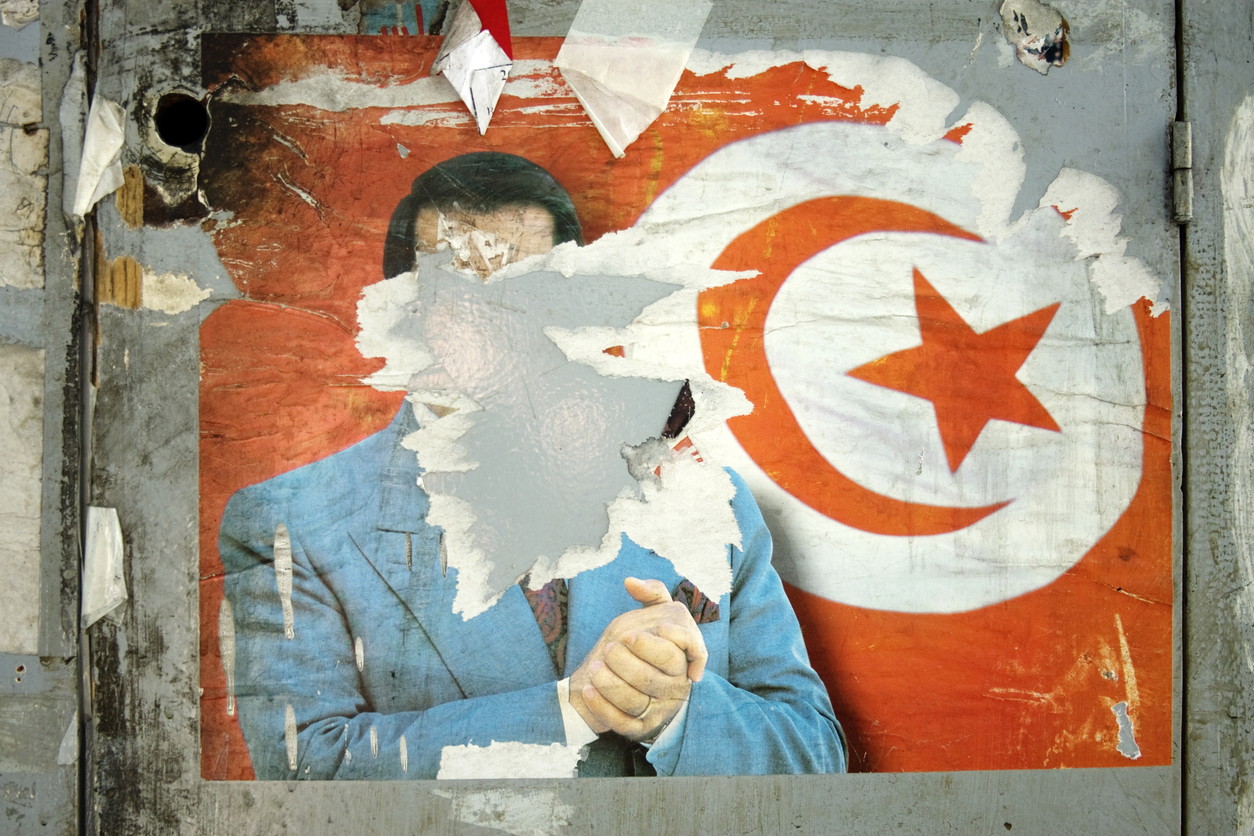Time Period: 2010-2015
Location: Tunisia
Main Actors: Tunisian General Labour Union (UGTT)
Tactics
– General strikes
– Protective Presence
– Assemblies of protest or support
Between 1987-2011, Tunisia was an autocracy ruled by Zine El Abidine Ben Ali. Under Ben Ali, opposition parties, civil society activists, and journalists were repressed, harassed, exiled, and tortured. Tunisian elections were unfree and unfair: Ben Ali either ran for the presidency unopposed, placed restrictions on opposition candidates, or used legal instruments and state media to guarantee his re-election. Tunisia’s woeful economy and authoritarianism motivated the self-immolation of street vendor Mohamed Bouazizi in 2010. This prompted mass protests throughout the country that became the Tunisian or “Jasmine” revolution, leading to Ben Ali’s resignation as well as Tunisia’s partial democratization. Tunisia’s revolution diffused throughout the Middle East and North Africa, helping to inaugurate the wider “Arab Spring.”
The Tunisian General Labour Union (UGTT), founded in 1946 and representing over a million workers, served as a key pillar of support for Ben Ali’s regime. However, it walked a fine line between support and opposition. On the one hand, UGTT is closely connected to the Tunisian people: it played a key role in the 1952-56 anti-colonial struggle and has consistently opposed the imposition of neoliberal economic policies. On the other hand, Ben Ali successfully co-opted many of UGTT’s top leaders into the state apparatus, showering them with privileges and blackmailing those who threatened his authority.
At the beginning of Tunisia’s 2010 protests, UGTT’s secretary general met with Ben Ali and pledged continued union support. However, as the Ben Ali regime increasingly repressed and killed protesters –including many union members– UGTT leaders opted for a more confrontational policy. For example, in January 2011, UGTT began authorizing local unions to call strikes as they saw fit, which led to a huge growth in strikes across the country. As protests grew, so too did defections among Tunisian governing elites as well as among the security forces, many of whom refused to harm protesters.
UGTT’s well-established infrastructure enabled it to play an indispensable role in Tunisia’s revolution. For one, its leadership helped organize and coordinate strikes between the various national, regional, and local union branches. As a multi-sector union, UGTT brought together factory workers, bureaucrats, physicians, lawyers, human rights activists, and even the unemployed. During the revolution, UGTT offices across Tunisia served as a strategic meeting place for those organizing protests as well as a refuge for protesters who sought to avoid state violence. Protesters would often begin activities outside UGTT’s headquarters in the capital Tunis. Another crucial function served by UGTT was to give the protests a more explicitly political framing: as Yousfi (2021) shows in interviews with protesters, UGTT helped transform popular demands from improving the economy to Ben Ali’s outright resignation.
UGTT’s pro-democracy actions did not cease after Ben Ali’s resignation. To the contrary, it continued to push for resignations among the rest of Ben Ali’s authoritarian government that remained after he fled to Saudi Arabia. UGTT helped ensure order and peace during a period of instability. The assassination of several Tunisian politicians in 2013 threatened to undo Tunisia’s democratic gains. In response, UGTT formed the “Tunisian National Dialogue Quartet” with three other civil society organizations. Together, the Quartet helped accelerate the adoption of Tunisia’s 2014 democratic constitution as well as the holding of democratic elections. The Quartet was later awarded the 2015 Nobel Peace Prize.
Despite the democratic gains made during and after the Jasmine revolution, democracy has been fragile in Tunisia. In 2015, incumbent president Kais Saied invalidated the new constitution, dissolved parliament, and dismantled the Constitutional Court. Some observers worry that UGTT has lost some of its revolutionary zeal and failed to attend to workers’ interests in democracy. Others insist that despite UGTT’s shortcomings, there are few entities that can effectively challenge Saied’s authoritarianism.
Democracy organizers in the US can learn much from the example set by Tunisia’s UGTT. For one, UGTT’s coalition against the Ben Ali dictatorship was quite broad, including not only wealthy and poor workers but also those without work. Mobilizing across income brackets is crucial at a time when autocrats in the US and elsewhere make populist appeals to those for whom the economy is not working. Second, the Tunisian case highlights the importance of strategic imperatives in pro-democracy action: UGTT leaders may or may not have been committed to democracy as a moral issue, but what was crucial was that they feared losing the Tunisian people’s support. Similarly in the US, politicians and other elites who support autocrats must understand the potential risks –electoral, economic, or otherwise– of doing so. Relatedly, the Tunisia case shows that a history of compliance with autocrats does not preclude pro-democratic action: many UGTT leaders had been co-opted in the Ben Ali regime yet still found ways to distance themselves from it in service of democracy. Finally, despite the weakening of unions in US national politics, they are not irrelevant. Many of the problems felt most acutely by ordinary Americans are driven by economic concerns that unions may help to address. The recent wave of strikes across the US and renaissance of union organizing is a testament to their continuing importance for democracy.
Where to Learn More
– Beinin, J. (2020). Arab Workers and the Struggle for Democracy. Jacobin.
– Benn, S. (2024). The Power of Labor: Tunisia’s trade union and the Arab Spring. theSquare.
– Chayes, S. (2014). How a Leftist Labor Union Helped Force Tunisia’s Political Settlement. Carnegie Endowment for International Peace.
– Cordall, S.S. (2022). Tunisia’s Powerful Labor Union Is Thwarting President Saied’s Ambitions. Foreign Policy.
– Yousfi, H. (2023). Organization and organizing in revolutionary times: The case of Tunisian General Labor Union. Organization, 30(4), 624-648.
You can access all the caselets from the Pillars of Support Project here.

